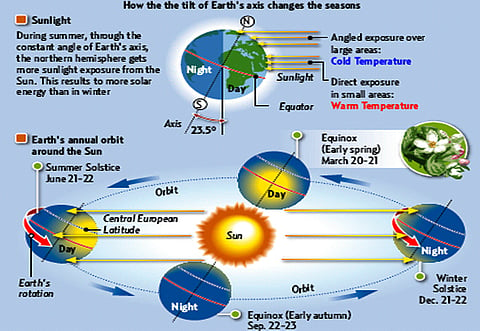Polling concerns, scepticism threaten climate change bill
Survey shows 50% think global warming worries are exaggerated

Washington : A growing number of Americans, nearly half the country, think global warming worries are exaggerated and more people doubt that scientific warnings of severe environmental fallout will ever occur, according to a new Gallup poll.
The new doubts come as President Barack Obama pressures Congress to produce legislation significantly cutting smokestack emissions of carbon dioxide and other greenhouse gases blamed for climate change problems.
Gallup's survey was released on the same day that the Obama administration unveiled in Texas a public-private report underscoring threats to birds as climate change alters their habitat and food supply, pushing many species to extinction.
With congressional elections in November, many lawmakers are hesitant to take on a controversial energy and environment bill, especially if voter interest is waning.
Global phenomenon
Around the world, concerns about climate change have dipped as economic worries took higher priority, according to a Nielson/Oxford University survey in December, which found the highest concern was in Latin America and Asia-Pacific countries like the Philippines, where typhoons are a big threat.
While US worries about climate change fell significantly in the Nielson poll, they did not come close to some eastern European countries such as Estonia, which ranked bottom.
In response to escalating attacks from global warming sceptics, the Union of Concerned Scientists on Thursday released a letter it said was signed by more than 2,000 climate scientists and economists, including some Nobel prize winners, urging the US Senate to pass a climate change bill. "The strength of the science on climate change compels us to warn the nation about the growing risk of irreversible consequences ... as temperatures rise further, the scope and severity of global warming impacts will continue to accelerate," they wrote.
The Gallup poll, conducted March 4-7, indicates a reversal in public sentiment on an issue that not only involves the environment, but also economic and national security concerns.
Forty-eight per cent of Americans now believe that the seriousness of global warming is exaggerated, up from 41 per cent last year and 31 per cent in 1997, when Gallup first asked the question.
The survey follows reports that some of the scientific details of findings that went into international global warming reports were either flawed or exaggerated. Supporters of a global effort to keep the Earth's temperatures from rising more than 2 degrees Celsius from pre-industrial levels agree that scientists need to be more fastidious in their research, but there is overwhelming evidence that a warming planet will lead to ice melting, flooding, drought, refugees and the spread of disease.
The US has made a non-binding pledge to seek a 17 per cent reduction in carbon emissions by 2020, from 2005 levels, mostly by switching to alternative energy, such as wind and solar power. But without legislation from Congress, that goal is unlikely to be met.
Antarctica was once warm, scientists say
Antarctica, the world's coldest place, had a balmy, subtropical climate 53 million years ago, a team of international scientists said yesterday on returning from a 57-day sojourn in the Southern Ocean.
The team, whose research ship docked in Hobart, Tasmania, drilled 1,000 metres into the ocean floor to extract 3,000 cores that are testimony to the changing climate. They drilled into the ocean floor rather than on Antarctica itself because they could go deeper — and so further back in time.
Dutchman Henk Brinkhuis, co-leader of the expedition along with Spain's Carlota Escutia, said they expected to reach back 37 million years but actually managed to delve into rocks, fossils and microbes more than 50 million years old.
"We had some specta cular finds," Brinkhuis told Hobart's Mercury newspaper. "What we're doing is basically reading a history book that's been written in some really weird language."
He said studying the cores could help explain why the ice arrived.



